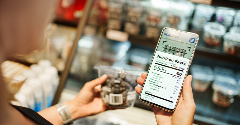News
Fraunhofer develops faster test for beer
7 Jan 2015To guarantee high quality beer, breweries monitor the production process very closely, notes Fraunhofer Institute. With a new polymer powder developed by the organisation, this monitoring will be faster and simpler in the future, it says. Manufacturers can also test drinks such as milk, juice, cola and red wine with the quick check. Brewers try […]

 To guarantee high quality beer, breweries monitor the production process very closely, notes Fraunhofer Institute. With a new polymer powder developed by the organisation, this monitoring will be faster and simpler in the future, it says. Manufacturers can also test drinks such as milk, juice, cola and red wine with the quick check.
To guarantee high quality beer, breweries monitor the production process very closely, notes Fraunhofer Institute. With a new polymer powder developed by the organisation, this monitoring will be faster and simpler in the future, it says. Manufacturers can also test drinks such as milk, juice, cola and red wine with the quick check.
Brewers try to keep the product free from harmful microorganisms because pathogens that enter into the beer during the brewing process can spoil the pleasure of the drink. They not only provide strong variations in taste and smell; the beer can also become cloudy, sour and unwholesome.
Therefore, ongoing quality controls accompany the production process. However, conventional microbiological methods require five to seven days to detect beverage-spoiling organisms, such as bacteria and yeasts. It is often too late at that point to take corrective action.
In collaboration with GEN-IAL from Troisdorf, researchers at the Fraunhofer Institute for Applied Polymer Research IAP in Potsdam have developed a polymer powder that significantly simplifies these tests and shortens the time that they require. The company supplies breweries with analysis tools for quality control.
From the test to the reliable result takes two to three days. The reason: until recently, beer has been filtered in special equipment. In this process, the bacteria remain on a membrane and are then elaborately cultivated in a special culture medium before they can be examined microscopically. The new polymer powder from the IAP replaces this process: the powder is added to the liquid sample. The powder’s functionalised surface binds the bacteria efficiently. The pathogens adhere to the 100 to 200 micron powder particles. These can be easily removed along with the microbes in a specially developed system and analysed directly using various microbiological methods. The time-consuming enrichment in a nutrient medium is no longer necessary.
With the new method, food experts can investigate beer and other beverages for infection by pathogens, which, says Fraunhofer, was hardly or not at all possible with the traditional membrane filtration method.
“Membrane filtration is not suitable for the quality control of beverages such as fruit juices, milk, cola and red wine. They contain so much solid or suspended matter that the filter clogs quickly,” said Dr. Andreas Holländer, scientist at the IAP. Breweries have also only been able to examine small sample volumes of up to one litre via membrane filtration. With the polymer powder, tests with 30 litres or more are possible.
“Wherever a small amount of microbes has to be extracted from a large amount of liquid, the new technique can be useful,” added Holländer.
“Through the use of the powder, food safety is increased, since it is more likely to find trace contaminants in large volumes of the beverages,” said Dr. Jutta Schönling, managing director of Gen-IAL.
Related news

Has ‘clean’ had its day?
22 Dec 2025
Wielding clean-label positioning and fortification as marketing levers is a dangerous strategy, and brands would be better off explaining the hows and whys of the ingredients in their products, say experts.
Read more
Celebrating the winners of the Fi Europe Innovation Awards 2025
3 Dec 2025
Food industry stakeholders celebrated as the winners of the Fi Europe Innovation Awards were announced at a ceremony in Paris.
Read more
Alternative protein startups pivot to B2B ingredients amid funding shift
27 Nov 2025
Alt protein startups are pivoting from consumer meat analogues to high-value B2B ingredients, driven by stronger investor interest, better margins, and clearer commercial pathways.
Read more
Walmart Marketplace’s record growth prompts search for UK sellers
26 Sep 2025
Walmart’s third-party e-commerce platform, Marketplace, has witnessed extraordinary growth – but a need for more product diversity has prompted the retailer to recruit UK sellers.
Read more
The winners of Vitafoods Europe Startup Challenge 2025 revealed
29 May 2025
Four startups – Yomio Drops, PFx Biotech, Revobiom, and Favamole – took top prizes at this year’s Vitafoods Europe Startup Challenge awards.
Read more
East takes on West in the fight for future food flavours
30 Apr 2025
Asian and South American flavours are now key components on global menus, driven by a growing global appetite for culinary mashups.
Read more
Food companies urged to bring ‘joy’ and urgency to healthy food mission
14 Mar 2025
For too long, businesses have treated health and sustainability as separate agendas – but there is growing evidence to show diets that benefit human health can also enhance that of the planet, say experts.
Read more
Entries open for inaugural Vitafoods Europe Innovation Awards
29 Jan 2025
Entries are open for the inaugural Vitafoods Europe Innovation Awards, celebrating the ingredients, finished products, partnerships, and initiatives redefining the nutraceutical landscape.
Read more
Paris Olympics: Food and beverage brands champion health, fun, and sustainability
5 Aug 2024
Food and beverage brands are aligning with the Paris Olympics 2024 Food Vision, which emphasises sustainability, local sourcing, and plant-based diets.
Read more
Natural Remedies: Bringing health and happiness via validated branded ingredients
18 Apr 2024
Natural Remedies is an internationally renowned botanical healthcare company committed to advancing the field through rigorous research and the development of clinically validated Branded Ingredients. Guided by our foundational principle of ‘BEING USEF...
Read more